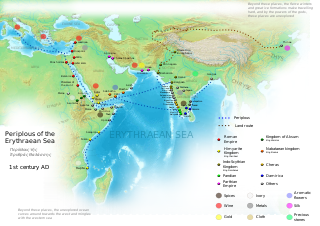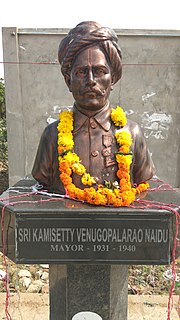
Puducherry, also known as Pondicherry, is one of the 8 union territories of India. It was formed out of four territories of former French India, namely Pondichéry, Karikal (Karaikal), Mahé and Yanaon (Yanam), excluding Chandernagore. It is named after the largest district, Puducherry. Historically known as Pondicherry, the territory changed its official name to Puducherry on 20 September 2006.

French India, formally the Établissements français dans l'Inde, was a French colony comprising geographically separate enclaves on the Indian subcontinent. The possessions were originally acquired by the French East India Company beginning in the second half of the 17th century, and were de facto incorporated into the Republic of India in 1950 and 1954. The French establishments included Pondichéry, Karikal, Yanaon on the Coromandel Coast and Mahé on the Malabar Coast and Chandernagor in Bengal. French India also included several loges in other towns, but after 1816, the loges had little commercial importance and the towns to which they were attached came under British administration.

Yanam is a town located in Yanam district, Puducherry, India, which forms a 30 km² enclave in the district of East Godavari in Andhra Pradesh. It has a population of 35,000, most of whom speak Telugu. It was formerly a French colony for nearly 200 years, and, though united with India in 1954, is still sometimes known as "French Yanam". It possesses a blend of French culture and the Telugu culture prevailing in Andhra Pradesh, nicknamed Frelugu. During French rule, the Tuesday market at Yanam was popular among the Telugu people in the Madras Presidency, who visited Yanam to buy foreign and smuggled goods during Yanam People's Festival held in January. After implementation of the Child Marriage Restraint Act, 1929 in British India, Telugu people often traveled to Yanam to conduct child marriages, which remained legal under the French administration.

Édouard Goubert was former mayor and first chief minister of Puducherry between 1 July 1963 and 11 September 1964. Initially a strongly pro-French leader, he later shifted towards the pro-merger Indian National Congress, which ultimately became the death knell for the sovereignty of France's comptoirs in India. He and Lambert Saravane founded the French India Socialist Party in 1947.
Dadala Raphael Ramanayya was an Indian nationalist leader who was instrumental in the merger of the French territory of Yanam into the Republic of India.
The Pondicherry Municipal Council, is the municipal corporation of Pondicherry, India. Pondicherry has had a French system of municipal administration since 1880 and till the last poll held in 1968. Recently, in 2006 again municipal elections were held.
Though the French established colonies in India in the 17th century itself, it was not until the end of the 19th century they started civil administration in French India.
The Coup d'état of Yanaon (Yanam) was a tense but ultimately non-lethal political coup at Yanam, India, in 1954. It occurred as India and France held ongoing negotiations regarding the future of French settlements in India. Yanam, along with Pondicherry, Karikal, and Mahé, was one of four small French colonial enclaves remaining in India after its 1947 independence from Britain. Though widely separated along both of India's coasts, the towns were collectively known as Pondicherry [Fr: Pondichéry; mod. India: Puducherry], after the largest of the settlements.

The City of Puducherry on the southeast coast of India does not have a recorded history from antiquity. Puducherry has history recorded only after the advent of the colonial powers such as the Dutch, Portuguese, English and the French. Nearby places such as Arikanmedu, Kakayanthoppe, Villianur, and Bahur, which were annexed by the French East India Company over a period of time and became the Union Territory of Puducherry after Independence, have written histories that predate the colonial era.

Kamichetty Venougopala Rao Naidu better known as The Grand Old Man of Yanaon was Mayor and MLA of Yanaon during French rule in first half of 20th century. He was one of the two powerful political leaders in Yanam during French rule. His opponent was Bezawada Bapa Naidou, the first mayor of Yanam. After death of Bapa Naidou, he became Mayor of Yanam and even his family became very dominant in Yanam politics for at least 50 years thence.

Yanaon or Yanam was one of the five settlements of French India between 1731 and 1954.
The municipalities of Puducherry include five administrative municipalities in the Union Territory of Puducherry, India. The territory had French system of municipal administration from 1880 through 1968, when it was reformed.
The French community in India consists mainly of Indian citizens of French ancestry who are descended from former French settlers and colonists who settled in India since the 17th century, as well as recent expatriates from France.
The French India Socialist Party was a political party in French India. The party was led by Édouard Goubert, Minister for General Administration for French India. The party played a dominant role in the political life in the colony, being backed by the French administration. The party favoured retaining links with France, but would eventually turn against French rule.
The Communist Party of French India was a political party in French India. V. Subbiah was the secretary of the party.
The National Democratic Front was a political coalition in French India. The movement dominated the political scene in the colony for a brief period until the emergence of a split between the socialists and communists in the coalition.
The Treaty establishing De Jure Cession of French Establishments in India was a "TREATY BETWEEN THE REPUBLIC OF FRANCE AND INDIA ESTABLISHING CESSION BY THE FRENCH REPUBLIC TO THE INDIAN UNION OF THE FRENCH ESTABLISHMENTS IN INDIA" signed between France and India in 1956.

Maurice Paquirissamypoullé, or Paquirissamy-Poullé, was a rice trader and politician from the colony of Karaikal in French India. He represented the colony in the Council of the Republic from 1947 until 1955, when his seat was dissolved following the union with India. He did what he could to ensure a peaceful transition of power.
In 1946, French India became Overseas territory of France. Then, in the same year on 25 October, the Representative Assembly of French India of 44 members has been created that replaced the general council of 30 members.
After merger of French settlements into Indian Union, a new assembly, named as Pondicherry Representative Assembly has been created by Government of India. After the de-factor merger and before the legal integration with the Indian Union on August 16, 1962, general elections to the assembly were held in 1955 and 1959.








